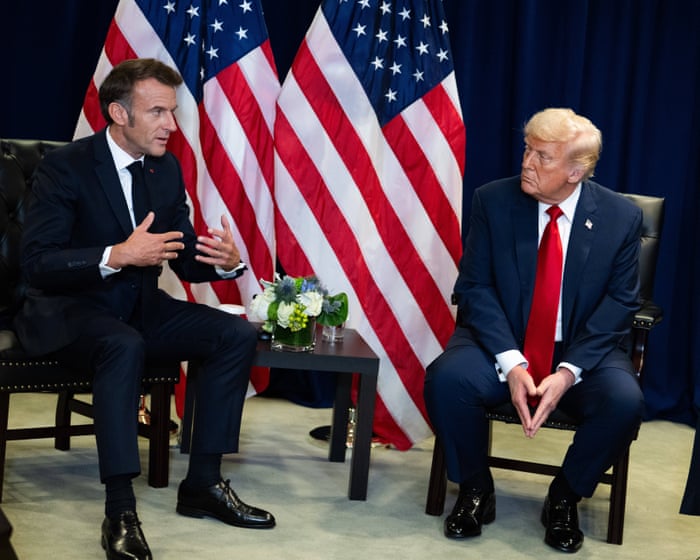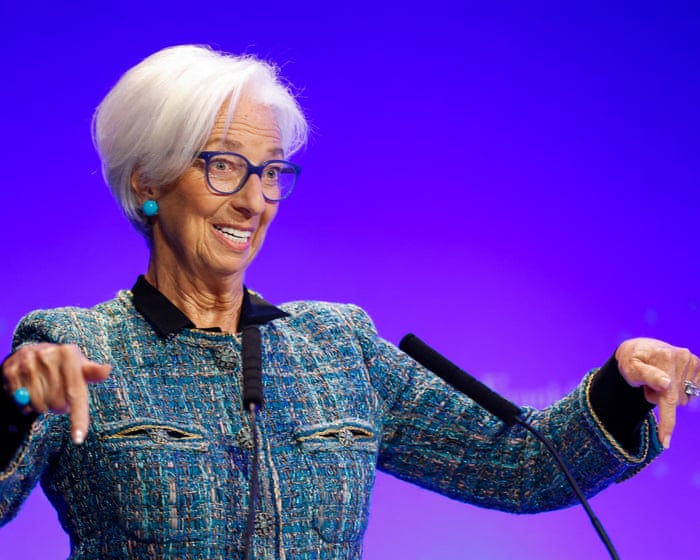French President Emmanuel Macron stated on Wednesday that any Israeli attempt to annex parts of the West Bank would cross a red line for the United States and would end the normalization of diplomatic relations between Arab states and Israel. Macron claimed he received this assurance from Donald Trump.
Macron also revealed that he presented Trump with a three-page plan for Palestine’s future, based on the New York Declaration—a document supported by over 143 countries that aims to exclude Hamas from governing Gaza and the West Bank.
In an interview with France 24, Macron said his goal in meeting with Trump on Tuesday was to align the positions of the U.S., Europe, and Arab nations. When asked about Israeli settlement expansion plans in the West Bank—including the E1 corridor project involving 3,400 new homes—Macron stated, “On that topic, in very clear terms, the Europeans and the Americans are on the same page.”
British officials have raised concerns that Trump might recognize Israeli sovereignty over West Bank settlements in retaliation for the UK, Australia, France, and others recognizing Palestine. Such a move would severely undermine the two-state solution.
Macron warned that annexation “would be the end of the Abraham Accords, which was one of the success stories from Trump’s first administration. The United Arab Emirates were very clear on it.” He added, “I think it is a red line for the USA.”
Macron’s comments offer the clearest look yet at behind-the-scenes diplomacy regarding plans for the aftermath of the Gaza conflict. The 2020 Abraham Accords, which normalized relations between Israel and several Arab states including the UAE, are considered by Trump as a major diplomatic achievement of his first term.
If Trump insists that annexation must not proceed, Israeli Prime Minister Benjamin Netanyahu would face significant political pressure, as factions within his far-right coalition demand Israel seize part or all of the West Bank. Conversely, if Netanyahu moves forward with annexation—with U.S. support or silence—the two-state solution would be critically endangered. Netanyahu is scheduled to meet Trump at the White House on Monday and address the UN General Assembly on Friday.
Macron said the first step in his “brand new” multi-stage plan is to secure a ceasefire and the release of all hostages. He appealed directly to Trump, saying, “You have a major role to play and you want to see peace in the world.” Macron emphasized the need to “convince the Americans to put pressure on Israel,” noting that the U.S. holds “real leverage.”
Trump’s special envoy, Steve Witkoff, also mentioned that the president presented a 21-point Middle East peace plan to regional Arab and Muslim leaders on Tuesday. Speaking at a UN General Assembly side event, Witkoff said, “We’re hopeful—and I might say even confident—that in the coming days we’ll be able to announce some sort of breakthrough.”We use your data as outlined in our Privacy Policy. To protect our website, we use Google reCaptcha, and the Google Privacy Policy and Terms of Service apply.
After the newsletter promotion:
Macron stated that France’s recognition of the state of Palestine was meant to kickstart a peace process, which he believes is the best way to isolate Hamas. He emphasized the goal of demilitarizing and dismantling the militant group.
However, he suggested that some right-wing members of Israel’s cabinet are more focused on sabotaging any political agreement. “The aim of some is not to fight Hamas but to undermine the chance for peace,” he said, adding, “There is no Hamas in the West Bank.”
Macron stressed that Netanyahu’s strategy of total war has failed, as it endangers hostages and has not reduced Hamas’s military strength. “There are just as many Hamas fighters as before. From a practical standpoint, total war isn’t working. This war is a failure.”
He argued that the fate of hostages and Gaza’s civilians should not be left “in the hands of those who don’t prioritize their release.” Macron added, “If Netanyahu’s top priority were the hostages, he wouldn’t have launched the recent offensive on Gaza City or struck negotiators in Qatar.”
He insisted that, as part of a future governance plan for Gaza and the West Bank, Hamas would be removed and a reformed Palestinian Authority would eventually take over, though he did not provide a timeline.
Macron warned that if the fighting does not end soon, Europe will need to consider further steps. When asked if that meant sanctions, he replied, “Obviously.” Questioned about whether there would be majority support for EU sanctions, he said he is working to build consensus, noting that each country has its own history and sensitivities—a reference to Germany and Italy, which have resisted sanctions.
Arguing that Palestinians must be offered a political future, Macron said the heart of his argument is that “if you don’t give people a political path to their legitimate existence—something the international community recognized 78 years ago—you lead them to hopelessness or even worse violence.”
Frequently Asked Questions
Of course Here is a list of FAQs about French President Emmanuel Macrons statement regarding potential Israeli annexation of the West Bank designed to be clear and natural
BeginnerLevel Questions
1 What is the main issue here
Frances President Emmanuel Macron stated that if Israel with support from the US were to officially take control of the West Bank it would be a serious violation that France could not accept
2 What is the West Bank
The West Bank is a territory located west of the Jordan River It is currently occupied by Israel but is claimed by Palestinians as part of a future independent state
3 What does annexation mean in this context
Annexation means one country formally declaring another territory to be part of its own In this case it would mean Israel applying its laws to the West Bank effectively claiming it as Israeli land
4 What is a red line in politics
A red line is a strong warning It signifies a limit or boundary that if crossed by another country will trigger a serious response such as sanctions condemnation or other diplomatic actions
5 Why does France care about this
France is a major European power and a permanent member of the UN Security Council It has a longstanding policy of supporting a twostate solution and sees annexation as a major threat to peace and international law
Advanced Detailed Questions
6 What was the specific US role that Macron was referring to
Macron was referring to the Trump administrations Middle East peace plan which gave a green light for Israel to annex significant parts of the West Bank He viewed this US support as enabling the move
7 What kind of consequences did Macron threaten if the red line was crossed
While Macron did not specify exact measures crossing a diplomatic red line typically leads to consequences like recalling an ambassador supporting UN resolutions against the country or imposing economic and diplomatic sanctions
8 How does this stance fit with Frances broader foreign policy
This position aligns with Frances traditional role as a defender of a rulesbased international order It positions France as a counterweight to US policy in the region and reinforces its identity as a leader within the European Union on



